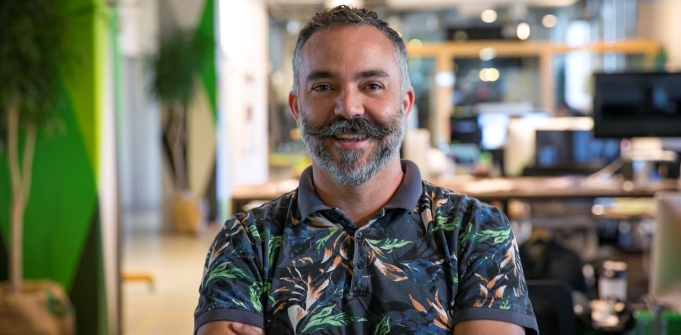
Vend founder Vaughan Rowsell. Source: Supplied
The founder of New Zealand based fintech startup Vend has urged early-stage startups to eschew common stigmas to think differently when hiring new people, and consider hiring “unqualified” people to help ease Australia’s tech skills shortage.
Vaughan Rowsell founded Vend, a point-of-sale and inventory management software solution for retailers, in 2010, helping scale the startup to more than 180 million in yearly transactions, and over $60 million of venture capital raised.
Vend employs 200 employees across the globe, including 14 in Melbourne.
In 2016, Rowsell stepped down as chief executive and continued on as head of product, handing the reins of the company to former chief financial officer Alex Fala. He tells StartupSmart the decision to step down was a fantastic one, mostly because his daughters “now know who I am”.
“What they don’t put on the chief executive role brochure is that you’re always at the apex of the pyramid for all the decisions, and at the inverse apex when it comes to the weight of expectations from shareholders and your board,” he says.
“When you’re leading a startup in high-growth mode you’re constantly on and that’s a given. You’re hiring people, dealing with issues, raising money; the list never gets shorter, it just gets longer and longer.”
That’s why one of the best pieces of advice Rowsell says he can give other founders is to learn how to delegate, and more importantly, to not be afraid to. The “fallacy of the hero startup founder” is a myth far too prevalent in the industry Rowsell believes, and he encourages founders to not try to take it all on themselves.
The true heroes, he believes, are those who join early-stage startups as the jack of all trades, doing the jobs of three or four people at once without having an official job description themselves.
“They’re happy to roll up their sleeves and jump into it. The most valuable people for startups early are those heroes — those ambiguous, early-stage workers who are able to get stuff done somehow,” he says.
Like all good things though, these employees for all seasons have a time and place in a startup, and Rowsell says as much as it can be tempting for founders to stick with them, they mustn’t be afraid to start hiring specialised roles.
“It’s a natural evolution: as you grow, you start taking off your many hats, and you start to focus on specialisation. Optimally, you want people thinking about one thing day in day out, so you start looking for specialists,” he says.
“It can be an awkward transition for companies to make, but you need different people for different phases of growth, and that can even mean swapping out your board, your executive team, or chief executive at times.
“But show me the startup that’s had the same 20 founding members for 10 or more years. It doesn’t exist.”
“Unskilled” people can solve tech’s talent shortage
Rowsell is also a staunch advocate for hiring people without tertiary or other notified qualifications, with Vend being signatory to an open letter signed by over 100 firms saying applicants at the company do not necessarily require those qualifications.
The founder himself is a serial dropout, leaving high school to study computer science at university, before dropping out after six months. He later tried picking up his studies again but ultimately left to pursue a world of startups.
“Startups should look for people who are hungry, scrappy, who learn in alternate ways but don’t have a certificate to prove they’re capable. I pretty much managed all of the engineering side of the business early on and I taught myself all of that,” he says.
“If you’re blazing a trail in a brand new space, such as blockchain, you can’t go out and hire a team of six blockchain experts. They don’t exist, they don’t teach that at uni.
“More and more young people want to be connected through a vision, not through a pay cheque, and they’re full of energy and looking to make their mark.”
With the Australian tech scene going through a well-documented (and protested) skills shortage, could Rowsell’s approach to hiring pose a solution for some startups looking to hire? He says yes, but warns there’s no easy, overnight solution. It’s a “ten-year problem”, he says.
“It’s a ten-year problem with a ten-year solution, but we should make sure the industry is open to everyone who wants to consider a career in tech,” he says.
“Removing the barrier of requiring degrees for entry-level jobs could help that. The space is moving so fast we want to welcome people on board who are passionate, and learn fast.”


COMMENTS
SmartCompany is committed to hosting lively discussions. Help us keep the conversation useful, interesting and welcoming. We aim to publish comments quickly in the interest of promoting robust conversation, but we’re a small team and we deploy filters to protect against legal risk. Occasionally your comment may be held up while it is being reviewed, but we’re working as fast as we can to keep the conversation rolling.
The SmartCompany comment section is members-only content. Please subscribe to leave a comment.
The SmartCompany comment section is members-only content. Please login to leave a comment.